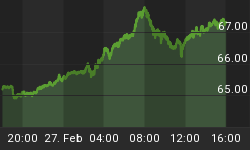
Photo courtesy of Pedro Moura Pinheiro
The famous and infamous Joe Granville once duly observed, "Remember, if it's obvious to the public - it's obviously wrong." Just a few years later - and with more than a tinge of irony, he failed to recognize his own wisdom as the U.S. equity markets quietly filled their tanks on the tarmac of one of the greatest bull markets in history.
It was the summer of 1982 and the U.S. was still reeling from the harsh tonic prescribed by the then disdained - but tenacious, Fed Chairman of a one, Paul A. Volcker. With the US economy falling into a recession in the summer of 1981 and with 10-year Treasury yields still hovering over 13%, investors relative optimism towards the economy and financial markets resonated deep concerns over the possible direction of interest rates and the fledgling recovery. It was stormy at Wall Street and Main - and the sun hadn't been seen in weeks.
Vartanig G. Vartan, a New York Times business reporter at the time, gathered the following comments from investors on August 6 and 7, 1982.
- "One big worry of money managers revolves around the economic recovery,' said Robert Grossman of Cantor, Fitzgerald & Company, an investment banking firm. 'In 16 years in this business, I've never seen so many people holding onto cash."
- "I detect increasing pessimism among people who are normally optimistic,' stated Theodore H. Halligan, an institutional salesman with Piper, Jaffray & Hopwood Inc. 'What are they worried about? The budget deficit, a lack of conviction that interest rates will stay down, a possible new crisis in the banking system. Now there is an added stress. The corporate investment committees that hire money managers are putting pressure on them to perform. Jobs are no longer safe. So we're seeing more funds being switched out of stocks and into bonds."
- "Today's drop in the Dow confirms that we're in a bear market,' said Edward P. Nicoski, technical analyst for Piper, Jaffray & Hopwood Inc. in Minneapolis, 'and it looks like we're going lower."
The following session, the equity markets made an intraday generational low. Embodying the prevailing sentiment, the most powerful pundit of the times told investors on August 16, 1982, that the recent move higher was a "folly" and "bull trap" and that "rising stock prices were like balloons that were about to burst". Unbeknownst to Joe Granville, the only balloon bursting that day was his larger than life reputation - as he remained mostly offsides or bearish for the better part of the next two decades.
Under the onus of introducing and carrying out another round of anticipated reforms, Xi Jinping assumed the presidency in China in March 2013. At the time, many analysts and economists viewed the situation in China as particularly grim - considering its legacy of robust growth over the past three decades that were driven by enormous investment within China and which appeared to be loosing momentum at a rapid rate. The catch phrase of the moment, an economic rebalancing, became synonymous with a great reckoning - with the implied understanding that China could be headed for a crash with considerable unknown consequence. As Paul Krugman bluntly proposed that summer, "...the only question now is just how bad the crash will be.
In our opinion, what the popular perspective failed to grasp was that the reforms were not about economics per se, but primarily driven by rooting out corruption that had infiltrated all levels of government - and which was a prerequisite to ensuring and maximizing future growth as the economy transitioned to a more mature footing. In essence, where the Chinese saw opportunity - the west feared economic instability.
Back in January, as concerns over the Chinese banking system were brought to focus after the Industrial & Commercial Bank of China refused to compensate investors in a troubled trust, we drew up a weak cartoon (see Here) that depicted what we believed was an overreaction by the west that played on these fears and cognitive biases. Although we won't dispute that future growth in China will likely be considerably less robust than what it was over the past three decades - or that investment excesses weren't evident; we do believe the binary implications inferred with the economic rebalancing hypothesis are misplaced and or exaggerated. Cynics will undoubtedly think otherwise, but while the prescriptions for their afflicted economies are quite different, the tough love provided by Volcker in 1981 and 1982 is similar to the anti-corruption campaign by Xi Jinping over the past two years. Both strangled the market for a spell and set the stage for the next phase in their respective economies.
Since the summer of 2013 (see Here), we have looked back at the summer of 1982 in the U.S. as a possible contrarian template of what might transpire in Chinese markets over the next few years. And while the comparative liftoff was delayed as President Xi Jinping chose to govern rather than stimulate over the past year, we believe the impression of the pattern holds true when considering the future prospects of China and their equity markets. Like the S&P 500 that exploded 40% in the back half of 1982, the Shanghai Composite is up over 46% this year - with nearly the entire rally manifesting since July.
Considering the size of the breakout that developed over a very short timeframe, it's not surprising that the index suffered on December 9th its largest loss since 2009. Moreover, it wouldn't surprise us to see greater volatility and similar churn develop over the next few weeks as the market further digests and consolidates the move.
As always, Stay Frosty - and we wish you and your family a wonderful holiday season and a healthy and peaceful New Year.




















